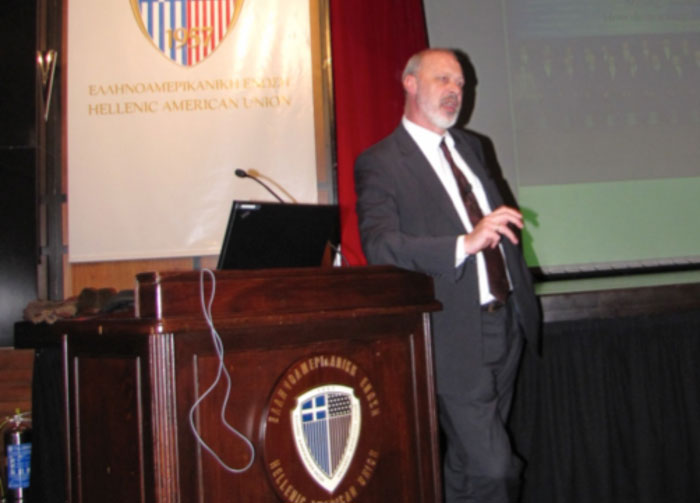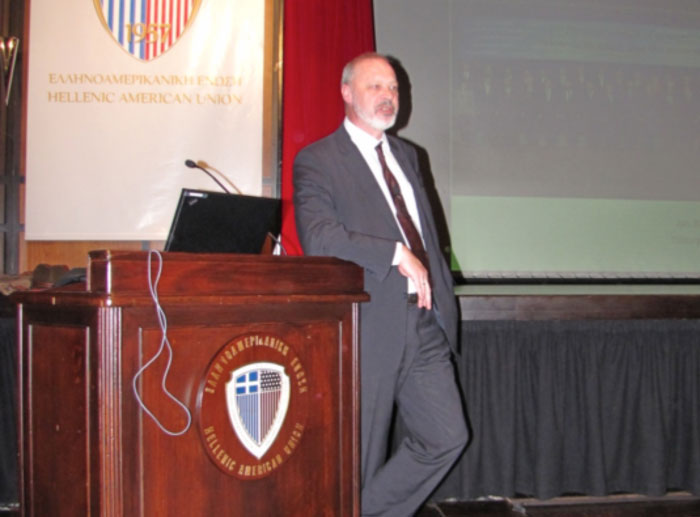Democracy is one of the main victims of the financial crisis which started in 2008. The crisis has, in particular, revealed the limits of the power of democracy and has aggravated public distrust in it. In a broad sense, it has been the consequence of some serious shortcomings in the functioning of democratic institutions, which were not able to anticipate, prevent, and quickly and adequately react to it without causing hardship to the people whom they are meant to serve and protect.
This was the main idea of Prof. Blommaert’s lecture given to a keen audience at the auditorium of the Hellenic American Union on the 27th of February.
Jan Blommaert is Professor and Chair of the research programme Language and Globalization at the Department of Culture Studies, and Director of Babylon, Centre for the Study of the Multicultural Society at Tilburg University, the Netherlands. He is also Professor of African linguistics and Sociolinguistics at Ghent University and holds honorary professorships in Beijing, China and Western Cape, South Africa. His professional engagements span almost three decades and are of vital importance to the fields of linguistic anthropology, sociolinguistics, African studies, literacy studies and, recently, the sociology of work.
Blommaert has also written extensively in Dutch, and in many ways there is a thematic continuity with the work in English, empirically addressing broader social and political issues in Belgian and Dutch society: nationalism, populism and democracy, asylum politics, issues in language and education, and essays on the sociology of work under neoliberalism.
Blommaert is also a Visiting Professor of the PhD programme in Applied Linguistics at the Hellenic American University.
His lecture was supported by the Division of Cultural Affairs of Hellenic American Union, the Hellenic American Education Centre and the Research Institute of Hellenic American University.
Blommaert said that after the outbreak of the global financial and economic crisis, many European democracies turned out to be powerless in the face of market forces, and thus suffered further loss of credibility on the part of their citizens. People in several European States lost a great part of their “popular sovereignty” – the only source of legitimate political power.
There is growing concern among Europeans who are witnessing the decline of their democratic capacity to cope with the consequences of the international financial crisis.
For these Europeans, it became evident that their national democracies were unable to protect them from the negative consequences of a financial crisis.
As a result of the imbalance of power between economics and democracy, important decisions are increasingly being taken outside parliaments and outside the democratic process as a whole. People have doubts about democracy because they feel unable to influence the political decision-making process on issues of the utmost importance to their daily lives.
Faced with the collapse of their economies and, in some cases, the risk of sovereign default, governments implemented harsh austerity policies, including lowering of wages and social benefits and increasing taxes. Confronted with a sharp fall in living standards, which put large clusters of population near or below the poverty threshold, people in many European countries took to the streets protesting, at times violently, against government policies perceived as the diktat of markets, and against being asked to pay the cost of the crisis.
 The paradox of today’s democracies is that, although never before have so many people lived in democracies, never before have so many people been disappointed with the quality of the democracy they live in and experience on a daily basis.
The paradox of today’s democracies is that, although never before have so many people lived in democracies, never before have so many people been disappointed with the quality of the democracy they live in and experience on a daily basis.
Democracy, ideally, offers real promise in terms of fair distribution of life chances and opportunities for all. The way in which democracy is exercised at present does not allow it to deliver on these promises. This is one of the main reasons why so many citizens in today’s Europe are turning their backs on institutionalised politics, not taking part in elections or, if they do vote, are showing populist, nationalistic and even xenophobic tendencies, a phenomenon witnessed in every part of Europe.
Democracy should be understood not just as a system or as the sum of individual rights, but as a form of society which requires rules for social justice and redistribution and implies not only delegating and taking decisions, but also discussing and living together in dignity, respect and solidarity.
Since much of Europe is now engaged in achieving the quick reduction of public deficits through drastic reduction of public expenditure, it is crucial to realistically scrutinise what the likely impact of the chosen policies may be, both on people and the generating of public revenue through economic growth. The high morals of ‘sacrifice’ do, of course, have an intoxicating effect.…
The unravelling of the euro is not just an economic and financial crisis, it is also a crisis of democracy. The peoples of Europe are losing the capacity to determine their own futures. From Vilnius to Athens, they are told that there is no alternative.
It is becoming ever clearer that what Europe is going through at the moment is not just an episode, but a power struggle between the primacy of economics and the primacy of politics.
Greece has for several years been facing a most serious and dramatic crisis, caused by an extremely high level of budget deficit and sovereign debt, and the country has subsequently been fighting to remain inside the euro currency system while being saved from insolvency by the European Union, eurozone member States and the International Monetary Fund (IMF).
Several other countries came under similar kinds of pressure and had to take serious decisions in order to avoid the disastrous economic consequences of failing financial institutions or of exhausted State funds.
It is more than evident that, during the period of financial and economic crisis, democracies in many countries have come under severe pressure. As States are losing their capacity to solve economic and social problems and influence the development of society, democratic decision-making cannot offer alternative options to citizens and representative office-holders.
In these countries, participation rates in conventional politics, such as election turnout, party membership, etc., have declined significantly over recent years. In a strong democracy, however, citizens’ participation should be enhanced and become more intense.
Prof. Blommaert believes that a greater involvement of citizens in politics can greatly contribute to establishing sounder democratic institutions.
“Vote” he said; but “Vote smart.” “Voting is a time when people choose credible leaders who are capable of bringing meaningful developments in their respective areas.”
Anastasia Spyropoulou
(anastasia@eltnews.gr)
